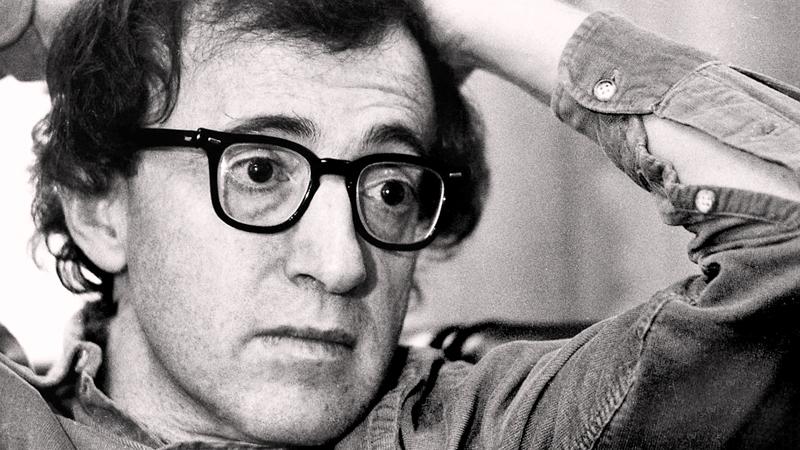
Woody Allen (born Allan Stewart Konigsberg; December 1, 1935) is an American film director, writer, actor, and comedian whose career spans more than six decades and multiple Academy Award-winning movies. He began his career as a comedy writer on Sid Caesar’s comedy variety program, Your Show of Shows, working alongside Mel Brooks, Carl Reiner, Larry Gelbart and Neil Simon. He also began writing material for television, published several books featuring short stories, and writing humou pieces for The New Yorker.
In the early 1960s, he performed as a stand-up comedian in Greenwich Village alongside Lenny Bruce, Elaine May, Mike Nichols, and Joan Rivers. There he developed a monologue style (rather than traditional jokes), and the persona of an insecure, intellectual, fretful nebbish. He released three comedy albums during the mid to late 1960s, even earning a Grammy Award nomination for his 1964 comedy album entitled simply, Woody Allen. In 2004 Comedy Central ranked Allen fourth on a list of the 100 greatest stand-up comedians, while a UK survey ranked Allen the third-greatest comedian.
 Woody Allen |
By the mid-1960s, Allen was writing and directing films, first specialising in slapstick comedies such as Take the Money and Run (1969), Bananas (1971), Sleeper (1973), and Love and Death (1975), before moving into dramatic material influenced by European art cinema during the late 1970s with Interiors (1978), Manhattan (1979) and Stardust Memories (1980), and alternating between comedies and dramas to the present.
Allen is often identified as part of the New Hollywood wave of filmmakers of the mid-1960s to late 1970s such as Martin Scorsese, Robert Altman, and Sidney Lumet.[8] He often stars in his films, typically in the persona he developed as a stand up. His film Annie Hall (1977), a romantic comedy featuring Allen and his frequent collaborator Diane Keaton, won four Academy Awards, including Best Picture, Best Director, Best Original Screenplay, and Best Actress for Keaton. Critics have called his work from the 1980s his most developed period. His films include Zelig (1983), Broadway Danny Rose (1984), The Purple Rose of Cairo (1985), Hannah and Her Sisters (1986), Radio Days (1987), Another Woman (1988), and Crimes and Misdemeanors (1989). Many of his 21st-century films, including Match Point (2005), Vicky Cristina Barcelona (2008), and Midnight in Paris (2011), are set in Europe. Blue Jasmine (2013) and Cafe Society (2016) are set in New York City and San Francisco.
Critic Roger Ebert described Allen as “a treasure of the cinema”. Allen has received many accolades and honours. He has received the most nominations for the Academy Award for Best Original Screenplay, with 16. He has won four Academy Awards, one for Best Director, and three for Best Original Screenplay. He also garnered nine British Academy Film Awards. In 1997, Allen was awarded the BAFTA Fellowship by the British Academy of Film and Television Arts.
In 2014 he received the Golden Globe Cecil B. DeMille Award for Lifetime Achievement and a Tony Award nomination for Best Book of a Musical for Bullets over Broadway. The Writers Guild of America named his screenplay for Annie Hall first on its list of the “101 Funniest Screenplays”. In 2011 PBS televised the film biography Woody Allen: A Documentary on its series American Masters.
Film activism
In 1987, Allen joined Ginger Rogers, Sydney Pollack, and Milos Forman at a Senate Judiciary Committee hearing in Washington, D.C., where they each gave testimony against Ted Turner’s and other companies’ colourising films without the artistes’ consent. Only one senator, Patrick Leahy, was present for the testimony. Allen testified:
If directors had their way, we would not let our films be tampered with in any way—broken up for commercial or shortened or colourised. But we’ve fought the other things without much success, and now colorization—because it’s so horrible and preposterous and more acutely noticeable by audiences—is the straw that broke the camel’s back...The presumption that colourises are doing him [the director] a favour and bettering his movie is a transparent attempt to justify the mutilation of art for a few extra dollars.
Allen also spoke about his decisions to make films in black and white, such as Manhattan, Stardust Memories, Broadway Danny Rose, and Zelig. Film director John Huston appeared in a pre-taped video, and Rogers read a statement by Jimmy Stewart criticizing the colorization of his film It’s a Wonderful Life.
Film preservation
In 1990, Allen and Martin Scorsese created The Film Foundation, a non profit film preservation organisation that collaborates with film studios to restore prints of old or damaged films. Allen sat on the foundation’s original board of directors alongside Robert Altman, Francis Ford Coppola, Clint Eastwood, Stanley Kubrick, George Lucas, Sydney Pollack, Robert Redford, and Steven Spielberg.
